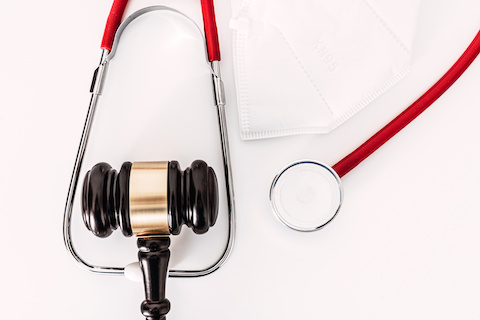
By Matthew R Hale
Its shocking to be in a hospital emergency room with a loved one who has a respiratory infection and a hard time breathing, to be told by someone alleged to be a medical doctor, “There’s nothing we can do until he is admitted.”
What about a breathing treatment to open the airway so he can breath?
“No, that doesn’t really do anything to the virus and, although it may make him more comfortable isn’t really helpful. We can test to confirm that he has either RSV, the flu or COVID, though.”
So would knowing what he has change treatment?
“No, not until he is admitted and his stats warrant it.”
Its even more shocking when the person is admitted and the only thing the hospital is willing to do is intubate and give remdesivir. As a medical malpractice lawyer, I received call after call from people angry that their loved ones, who went to highly regarded hospitals, were given no treatment until they were slammed with remdesivir and intubated. To make matters worse, they could not visit their loved one in the hospital so there was no one physically present to help make sure good care was provided.
For decades we have known that injuries from medical procedures, properly prescribed drugs, and illness or infections caught in the hospitals have been the third leading cause of death in the United States. For years, Jon Rappaport has talked about the research conducted by Barbara Starfield, MD in her blockbuster article, “Is US Health Really the Best in the World?” i He has pointed out numerous studies that have repeatedly shown that the U.S. health care system kills a lot of people.ii
Enter the Medical Malpractice Lawyers
I had a relative who was undergoing cancer treatment at a nationally known and highly respected local university hospital. For most of my career as a lawyer, I have done medical malpractice cases, which I translate as suing doctors and hospitals for harming people. My relative was proud to tell me during his chemotherapy treatments that the hospital nurses followed a very strict regimen when giving him his chemo to verify that they were giving the correct therapy to the correct patient. He explained that when he asked why they did it this way, the nurses answered: “The hospital had gotten sued too many times for patients getting the wrong chemotherapy, so we had to adopt strict procedures to prevent that from happening.” My relative looked at me and said, “I guess we should thank you for what you do.”
Attempting to put my own biases aside, medical malpractice lawsuits are really the only way in which doctors and hospitals are held accountable for harming patients. Civil lawsuits allow for attorneys to conduct discovery into hospital policies and procedures. Depositions of hospital nurses, doctors and administrators reveal truths about what goes on in the hospital. Civil discovery can unearth truly terrifying facts about the inner workings of the medical system. Often, the acts of the hospital staff and doctors are egregious and covered up with confidential settlements. Nonetheless, those settlements are a powerful financial incentive to change operations to prevent the harms that were the reason for the lawsuit.
Government Inoculation gives Immunity from COVID Liability
At the start of the Covid pandemic, there was fear that doctors and hospitals would be sued for malpractice for patients who died from Covid. There was a cry for state legislatures and governors across the country to change laws giving health care providers, hospitals, nurses, and doctors carte blanche liability protection for the treatment provided to Covid patients, and to prevent hospitals and doctors trying to treat Covid patients from being sued.
New York was the first state to pass a law providing immunity to health care providers for Covid treatment.iii In August of 2020, New York changed its immunity laws to make sure that treatment for the “prevention” of Covid-19 was specifically not protected. Other states soon followed. For example, in 2021 the State of Washington amended its medical malpractice statute to give doctors and hospitals a liability defense if the actions taken by the health care provider were “in good faith based upon guidance, direction, or recommendations, including in interim or preliminary form, published by the federal government, the state of Washington or departments, divisions, agencies, or agents thereof, or local governments in the state of Washington or departments, divisions, agencies, or agents thereof, in response to the COVID-19 pandemic and applicable to such health care provider….”iv The law says nothing about whether or not the government or agency proclamation has to be reasonable or not.
Thus, a doctor or hospital was essentially immune from any accountability for harm to Covid patients, caused by the government-dictated treatment protocols. Hospitals and doctors could simply hide behind, “we were just following orders in good faith.” Most states enacted legislation or executive orders that provided this level of immunity.v So, by following the treatment protocols of the federal government, state government, or local government, your local friendly emergency room doctor and hospital would not be sued. They faced no liability, were paid well for their efforts, and could move on to the next patient. But the real catch is if the hospital or doctor varied from the government-prescribed treatment protocols, then they faced the potential loss of this precious defense.
The stories are everywhere of doctors and hospitals refusing to prescribe certain treatments. There are stories of judges ordering hospitals to provide ivermectin and other drugs. People could not understand why the treating doctors were unwilling to stray from the government-issued treatment protocols. All along, the answer was simple: In all likelihood, the hospital-based doctors, who were refusing to do anything other than follow the government protocol, were doing it to protect themselves and their employers from liability. State and local licensing boards were able to go after the doctors when the liability defense was not enough incentive.
Bottom line, this means that in most states, there will be no lawsuits against hospitals for failing to provide effective treatment of Covid patients. There will be no lawsuits related to any patient who received care at a hospital that was merely following treatment protocols issued from governmental agencies.






In Montana state, the very first law ratified by newly elected RINO Gregory Gianforte was SB65, passed in April 2020. This same governor was found to own Pfizer and Moderna stock as early as 2019, clearly a conflict of interest. This same governor courted another RINO Senator Fitzgerald out of Helena to sell Senate Bill 65.
I was one of seven who personally showed to testify against SB65. Those in favor were a mind-numbing number of trough sucking special interest lobbyists/groups. SB65 also shifted liability to all the people of Montana if not following CDC Public Health Guidelines. Civil liability for the “alleged” or “potential” exposure to “SARS CoV-2 or it’s mutations or it’s conditions or the mutations of the conditions”. This civil liabilty was granted to the people when no such liability existed before then. Even better, the SARS CoV-2 product manufacturers are also immune. And guess what, the law sunsets January 1, 2031. Very convenient for the well known diabolical Agenda 21/Agenda 2030 plan. We must pursue the invading army! For if we pursue them we will recover. If we do not we will fail. These are uncircumcised Philistines and they cannot stand against the army of God! We must fight for our children, for our family, for our brothers and for our sisters. God bless you and God bless these united States of America!
Yes, but who actually has the legal authority to practice medicine? Only someone who has been given a license to practice medicine. If you do not have a license to practice medicine, then you can issue all the guidelines you like. As an example, the FDA does this with regard to its guidelines for the use and recommended dosing for all prescription medications. However, at the end of the day it is the person who has a license to prescribe drugs – doctors, for instance – who assumes the responsibility for the practice of medicine, including the prescribing and dosing of medications. The same is true with regard to surgical procedures. There are many guidelines and recommendations by those in authority (e.g. academicians) that surgeons use as references for individual surgical decisions. But in the final analysis it is the surgeon who assumes responsibility for which, if any, surgical procedure to recommend and perform. I do not think that doctors have any protection when it comes to the medical decisions that they, and only they, can undertake by virtue of the exclusive license that they have been given to practice medicine. I suggest that some clever and courageous attorney take on the assumption that those who do not have a license to practice medicine can do so via physician or surgical intermediaries. Kathleen T. Ruddy, MD
It’s an interesting situation. The SCOTUS upheld the liability protections under the Vaccine Injury Compensation Act. It’s pretty well accepted law that damage awards can specifically be limited in Medical Malpractice cases. Medical Malpractice itself is a creature of statute, meaning that it is regulated by the laws of the individual state. Each of those laws protect the individual doctor, who is as they say “the captain of the ship.” I have spoken to more than a few MD’s lately, who are tired of being told how to practice by MBA’s, managing hospitals. Likewise, health insurance companies have successfully dictated health care for decades. And, now, many if not most doctors are employees of large healthcare entities, which also set up policies and procedures. What we need is a courageous and informed public to change these laws.
Yes, that seems to be the case . Here’s a sad example:
https://healthfreedomforhumanity.org/voices-of-the-victims-episode-20/
I have a friend whose brother was killed
having undergone a hospital treatment protocol
for Covid. These protocols have been around for
other conditions for quite some time. And given
medical treatment related deaths are the third leading cause of deaths in this country, there ought to be a law against
treatment protocols. Time for the medical system as we know it
to collapse. And a more holistic approach be taken in its place.